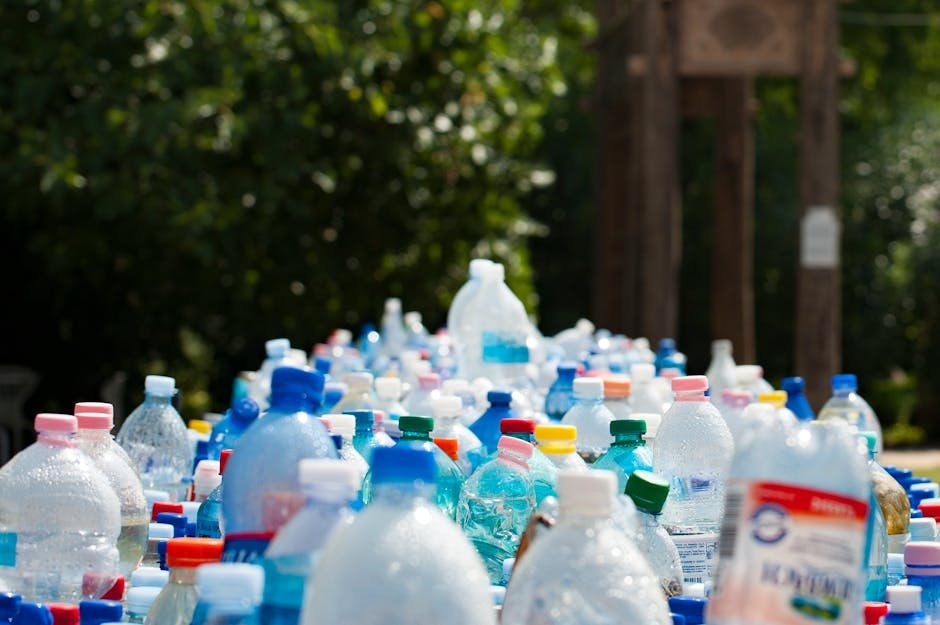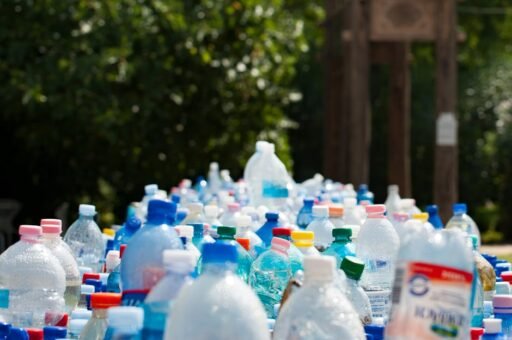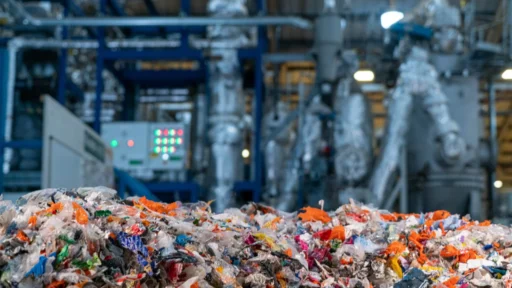-
Table of Contents
- Introduction
- Economic Benefits of Investing in Plastic Recycling Machinery
- Promoting Sustainable Manufacturing via Recycled Plastics
- Enhancing Ocean Cleanup Efforts with Plastic Recycling Innovations
- Lowering Carbon Footprint with Advanced Recycling Technology
- Reducing Landfill Waste Through Plastic Recycling Machines
- Q&A
- Conclusion
Introduction
Plastic recycling machines have the potential to significantly alter the environmental landscape by addressing the pervasive issue of plastic waste. These machines facilitate the conversion of discarded plastic materials into reusable forms, thereby reducing the volume of plastic that ends up in landfills and oceans. By enabling the efficient processing of plastic waste, recycling machines help conserve natural resources, lower greenhouse gas emissions, and decrease the energy consumption associated with producing new plastic products. Additionally, the widespread adoption of plastic recycling technology can stimulate the development of a circular economy, where materials are continuously repurposed, leading to more sustainable production and consumption patterns. This shift not only mitigates the environmental impact of plastic pollution but also promotes a more responsible and eco-friendly approach to managing the planet’s resources.
Economic Benefits of Investing in Plastic Recycling Machinery
Investing in plastic recycling machinery can yield significant economic benefits, transforming not only the environment but also the financial landscape of businesses and communities. As the world grapples with the mounting plastic waste crisis, the economic advantages of recycling become increasingly apparent. By turning waste into valuable resources, plastic recycling machines offer a sustainable solution that can drive economic growth and create new opportunities.
Firstly, the implementation of plastic recycling machinery can lead to substantial cost savings for businesses. Companies that produce plastic products or use plastic packaging can reduce their raw material expenses by incorporating recycled plastics into their production processes. Recycled plastics are often cheaper than virgin materials, allowing businesses to lower their production costs and improve their profit margins. Additionally, by investing in recycling machinery, companies can mitigate the costs associated with waste disposal and landfill fees, which are becoming increasingly expensive as landfill space diminishes.
Moreover, plastic recycling machinery can stimulate job creation and economic development. The recycling industry requires a diverse workforce, from machine operators and maintenance technicians to quality control specialists and logistics coordinators. As more businesses invest in recycling technology, the demand for skilled workers in this sector will rise, leading to job creation and economic growth in local communities. Furthermore, the development of a robust recycling infrastructure can attract investment and foster innovation, as companies seek to capitalize on the growing market for recycled materials.
In addition to direct economic benefits, plastic recycling machinery can also enhance a company’s reputation and brand value. Consumers are becoming more environmentally conscious and are increasingly favoring businesses that demonstrate a commitment to sustainability. By investing in recycling technology, companies can showcase their dedication to environmental stewardship, which can enhance their brand image and attract eco-conscious customers. This, in turn, can lead to increased sales and customer loyalty, further boosting the company’s bottom line.
Transitioning to a circular economy, where waste is minimized, and resources are continuously reused, is another significant economic benefit of plastic recycling machinery. In a circular economy, materials are kept in use for as long as possible, extracting maximum value before recovering and regenerating products at the end of their service life. Plastic recycling machines play a crucial role in this model by enabling the efficient processing and repurposing of plastic waste. This not only reduces the demand for virgin materials but also decreases the environmental impact associated with plastic production and disposal. As a result, businesses can achieve greater resource efficiency and sustainability, which can lead to long-term economic resilience.
Furthermore, government incentives and regulations are increasingly favoring businesses that invest in recycling technology. Many governments offer tax breaks, grants, and other financial incentives to encourage companies to adopt sustainable practices. By investing in plastic recycling machinery, businesses can take advantage of these incentives, reducing their overall investment costs and accelerating their return on investment. Additionally, as regulations around plastic waste management become more stringent, companies that proactively invest in recycling technology will be better positioned to comply with new laws and avoid potential fines and penalties.
In conclusion, the economic benefits of investing in plastic recycling machinery are multifaceted and far-reaching. From cost savings and job creation to enhanced brand value and compliance with government regulations, the advantages are clear. By embracing recycling technology, businesses can not only contribute to a more sustainable future but also unlock new economic opportunities and drive long-term growth. As the world continues to confront the challenges of plastic waste, the role of plastic recycling machinery in shaping a more sustainable and prosperous economy cannot be overstated.
Promoting Sustainable Manufacturing via Recycled Plastics

Plastic recycling machines have the potential to revolutionize the manufacturing industry by promoting sustainable practices and significantly reducing environmental impact. As the world grapples with the mounting crisis of plastic pollution, these machines offer a viable solution to repurpose waste into valuable resources. By transforming discarded plastics into reusable materials, recycling machines not only mitigate the volume of waste but also conserve natural resources and energy.
One of the most compelling advantages of plastic recycling machines is their ability to reduce the dependency on virgin plastic production. Virgin plastic manufacturing is an energy-intensive process that relies heavily on fossil fuels, contributing to greenhouse gas emissions and environmental degradation. In contrast, recycling plastic requires significantly less energy, thereby lowering the carbon footprint associated with plastic production. This energy efficiency translates into reduced greenhouse gas emissions, which is crucial in the fight against climate change.
Moreover, the use of recycled plastics in manufacturing can lead to substantial cost savings. Recycled materials are often less expensive than their virgin counterparts, providing an economic incentive for businesses to adopt sustainable practices. Companies that integrate recycled plastics into their production processes can benefit from lower material costs, which can enhance their competitiveness in the market. Additionally, the growing consumer demand for eco-friendly products means that businesses can also gain a marketing edge by showcasing their commitment to sustainability.
Transitioning to recycled plastics also helps in conserving natural resources. The extraction and processing of raw materials for virgin plastic production deplete finite resources such as petroleum and natural gas. By recycling existing plastics, we can reduce the strain on these resources and promote a more circular economy. This approach not only preserves natural habitats and biodiversity but also ensures that resources are available for future generations.
Furthermore, plastic recycling machines play a crucial role in waste management. The accumulation of plastic waste in landfills and oceans poses severe environmental and health risks. Plastics can take hundreds of years to decompose, during which they release harmful chemicals and microplastics into the environment. Recycling machines help divert plastic waste from landfills and oceans, thereby reducing pollution and its associated hazards. This not only protects marine life and ecosystems but also safeguards human health by preventing the contamination of food and water sources.
In addition to environmental benefits, the adoption of plastic recycling machines can stimulate economic growth and job creation. The recycling industry has the potential to generate employment opportunities in various sectors, including collection, sorting, processing, and manufacturing. By investing in recycling infrastructure and technology, governments and businesses can create a robust green economy that supports sustainable development and provides livelihoods for communities.
However, the successful implementation of plastic recycling machines requires a collaborative effort from all stakeholders, including governments, businesses, and consumers. Policymakers must establish regulations and incentives that encourage recycling and the use of recycled materials. Businesses need to invest in advanced recycling technologies and redesign their products to facilitate easier recycling. Consumers, on the other hand, must adopt responsible consumption habits and actively participate in recycling programs.
In conclusion, plastic recycling machines hold the promise of transforming the manufacturing industry by promoting sustainable practices and reducing environmental impact. By decreasing reliance on virgin plastics, conserving natural resources, and mitigating waste, these machines can pave the way for a more sustainable and resilient future. Through collective action and commitment to recycling, we can harness the full potential of these machines to create a cleaner, healthier, and more sustainable world.
Enhancing Ocean Cleanup Efforts with Plastic Recycling Innovations
Plastic recycling machines have the potential to revolutionize our approach to ocean cleanup efforts, offering a promising solution to one of the most pressing environmental challenges of our time. As the world grapples with the growing menace of plastic pollution, particularly in our oceans, innovative recycling technologies are emerging as a beacon of hope. These machines not only help in reducing the amount of plastic waste that ends up in marine ecosystems but also contribute to the creation of a more sustainable and circular economy.
To begin with, plastic recycling machines can significantly enhance the efficiency of ocean cleanup operations. Traditional methods of collecting plastic waste from the ocean are often labor-intensive and time-consuming. However, advanced recycling machines equipped with cutting-edge technology can streamline this process. For instance, automated systems can be deployed to identify, collect, and sort plastic debris from the water with remarkable precision. This not only accelerates the cleanup process but also ensures that a larger volume of plastic waste is retrieved from the ocean, thereby mitigating its harmful impact on marine life.
Moreover, the integration of plastic recycling machines into ocean cleanup efforts can lead to the development of innovative recycling techniques. These machines are capable of processing various types of plastic waste, converting them into reusable materials. By transforming collected plastic into valuable resources, we can reduce the demand for virgin plastic production, which is a major contributor to environmental degradation. This shift towards recycling and reusing plastic not only conserves natural resources but also reduces greenhouse gas emissions associated with plastic manufacturing.
In addition to their environmental benefits, plastic recycling machines can also play a crucial role in raising public awareness about the importance of ocean conservation. By showcasing the tangible results of recycling efforts, these machines can inspire individuals and communities to take action against plastic pollution. Educational campaigns and community engagement initiatives centered around recycling technologies can foster a sense of responsibility and encourage sustainable practices. As more people become aware of the impact of plastic waste on our oceans, there is a greater likelihood of collective action to address this global issue.
Furthermore, the economic advantages of plastic recycling machines cannot be overlooked. The recycling industry has the potential to create numerous job opportunities, from machine operators and maintenance technicians to researchers and engineers developing new technologies. By investing in recycling infrastructure, governments and private enterprises can stimulate economic growth while simultaneously addressing environmental concerns. This dual benefit underscores the importance of supporting and expanding recycling initiatives as part of a comprehensive strategy to combat plastic pollution.
It is also worth noting that the deployment of plastic recycling machines can complement other ocean cleanup strategies. For example, these machines can work in tandem with floating barriers and skimmers designed to capture surface debris. By integrating various technologies and approaches, we can create a more effective and holistic solution to the problem of ocean plastic pollution. This collaborative effort can lead to cleaner oceans and healthier marine ecosystems, ultimately benefiting both wildlife and human populations.
In conclusion, plastic recycling machines hold immense potential to transform our approach to ocean cleanup efforts. By enhancing the efficiency of waste collection, promoting innovative recycling techniques, raising public awareness, and providing economic benefits, these machines can play a pivotal role in addressing the plastic pollution crisis. As we continue to develop and implement these technologies, it is crucial to support and invest in recycling initiatives to ensure a sustainable and thriving future for our oceans.
Lowering Carbon Footprint with Advanced Recycling Technology
Plastic recycling machines have the potential to significantly alter the environmental landscape by lowering the carbon footprint associated with plastic waste. As the world grapples with the escalating crisis of plastic pollution, these advanced technologies offer a beacon of hope. By transforming discarded plastic into reusable materials, recycling machines not only reduce the volume of waste that ends up in landfills and oceans but also diminish the need for virgin plastic production, which is a major contributor to greenhouse gas emissions.
To understand the impact of plastic recycling machines, it is essential to consider the lifecycle of plastic products. Traditional plastic manufacturing involves extracting fossil fuels, refining them, and then processing them into plastic. Each of these steps emits a substantial amount of carbon dioxide and other greenhouse gases. However, when plastic waste is recycled, the need for new raw materials is significantly reduced. This, in turn, lowers the overall carbon footprint of plastic production. Advanced recycling technologies, such as chemical recycling, can break down plastics into their original monomers, which can then be re-polymerized to create new plastic products. This process is more efficient and environmentally friendly compared to mechanical recycling, which often results in lower-quality plastic.
Moreover, plastic recycling machines can contribute to a circular economy, where materials are continuously reused, reducing the strain on natural resources. By converting waste into valuable resources, these machines help create a sustainable loop that minimizes environmental impact. For instance, recycled plastic can be used in various industries, from packaging to automotive, thereby reducing the demand for new plastic and the associated carbon emissions. Additionally, the energy required to recycle plastic is generally lower than that needed to produce new plastic from scratch, further contributing to a reduction in carbon emissions.
Furthermore, the deployment of plastic recycling machines can stimulate economic growth and create job opportunities. As more communities and businesses invest in recycling infrastructure, there is a growing demand for skilled workers to operate and maintain these machines. This not only helps in managing plastic waste more effectively but also supports local economies. Governments and organizations can play a pivotal role by providing incentives and funding for recycling initiatives, thereby accelerating the adoption of advanced recycling technologies.
In addition to economic benefits, plastic recycling machines can also foster environmental awareness and responsibility among consumers. As people become more conscious of the impact of their plastic consumption, they are more likely to support and participate in recycling programs. Educational campaigns and community initiatives can further enhance public understanding of the importance of recycling and the role of advanced technologies in mitigating environmental damage.
However, it is important to acknowledge that the effectiveness of plastic recycling machines depends on several factors, including the quality of the collected waste, the efficiency of the recycling process, and the market demand for recycled materials. Therefore, a holistic approach is necessary to maximize the benefits of recycling technologies. This includes improving waste collection systems, investing in research and development to enhance recycling processes, and promoting the use of recycled products.
In conclusion, plastic recycling machines hold immense potential to lower the carbon footprint and drive positive environmental change. By reducing the need for virgin plastic production, supporting a circular economy, and fostering economic growth, these advanced technologies can play a crucial role in addressing the plastic pollution crisis. However, a concerted effort from governments, businesses, and consumers is essential to fully realize the benefits of plastic recycling and create a sustainable future.
Reducing Landfill Waste Through Plastic Recycling Machines
Plastic recycling machines have the potential to significantly alter the environmental landscape by reducing the amount of waste that ends up in landfills. These machines, which are designed to process and repurpose plastic waste, offer a sustainable solution to one of the most pressing environmental issues of our time. By transforming discarded plastic into reusable materials, they not only mitigate the volume of waste but also contribute to a circular economy where resources are continuously reused rather than discarded.
One of the primary benefits of plastic recycling machines is their ability to decrease the sheer volume of plastic waste that accumulates in landfills. Landfills are not only unsightly but also pose serious environmental hazards. As plastic waste decomposes, it releases harmful chemicals and greenhouse gases, such as methane, which contribute to climate change. By diverting plastic waste from landfills, recycling machines help to reduce these emissions and the overall environmental footprint of plastic products.
Moreover, plastic recycling machines play a crucial role in conserving natural resources. The production of new plastic requires significant amounts of raw materials, including petroleum and natural gas. By recycling existing plastic, we can reduce the demand for these non-renewable resources. This not only conserves valuable natural resources but also reduces the energy consumption associated with the extraction and processing of raw materials. Consequently, the use of plastic recycling machines can lead to a decrease in the overall carbon footprint of plastic production.
In addition to environmental benefits, plastic recycling machines also offer economic advantages. The recycling industry creates jobs and stimulates economic growth by generating demand for recycled materials. Companies that invest in recycling technologies can also benefit from cost savings, as recycled plastic is often cheaper than virgin plastic. This economic incentive encourages more businesses to adopt sustainable practices, further amplifying the positive impact on the environment.
Furthermore, the advancement of plastic recycling technology has led to the development of more efficient and effective recycling processes. Modern recycling machines are capable of processing a wide variety of plastic types, including those that were previously considered non-recyclable. Innovations such as chemical recycling, which breaks down plastic into its basic chemical components, allow for the recycling of complex and contaminated plastics. These advancements ensure that a larger proportion of plastic waste can be repurposed, thereby reducing the amount that ends up in landfills.
Public awareness and participation are also crucial in maximizing the benefits of plastic recycling machines. Educating consumers about the importance of recycling and how to properly sort their waste can significantly increase the efficiency of recycling programs. Community initiatives and government policies that promote recycling can further enhance the effectiveness of these machines. By fostering a culture of recycling, we can ensure that more plastic waste is diverted from landfills and processed through recycling machines.
In conclusion, plastic recycling machines have the potential to bring about substantial environmental improvements by reducing landfill waste. Their ability to repurpose plastic waste conserves natural resources, reduces greenhouse gas emissions, and supports economic growth. As technology continues to advance, these machines will become even more efficient, capable of processing a wider range of plastics. However, the success of plastic recycling also depends on public participation and supportive policies. By embracing recycling practices and investing in advanced recycling technologies, we can create a more sustainable future and significantly reduce the environmental impact of plastic waste.
Q&A
1. **Question:** How do plastic recycling machines reduce landfill waste?
**Answer:** Plastic recycling machines convert plastic waste into reusable materials, significantly reducing the amount of plastic that ends up in landfills.
2. **Question:** In what way do plastic recycling machines help conserve natural resources?
**Answer:** By recycling plastic, these machines reduce the need for new raw materials, conserving natural resources like petroleum and reducing environmental degradation from extraction processes.
3. **Question:** How can plastic recycling machines decrease pollution?
**Answer:** They reduce the amount of plastic waste that can end up in oceans and other natural habitats, thereby decreasing pollution and protecting wildlife.
4. **Question:** What is the impact of plastic recycling machines on energy consumption?
**Answer:** Recycling plastic typically uses less energy compared to producing new plastic from raw materials, leading to lower overall energy consumption and reduced greenhouse gas emissions.
5. **Question:** How do plastic recycling machines contribute to a circular economy?
**Answer:** They enable the continuous reuse of plastic materials, promoting a circular economy where products are reused, remanufactured, and recycled, minimizing waste and resource use.
Conclusion
Plastic recycling machines can significantly impact the environment by reducing plastic waste, conserving natural resources, and lowering greenhouse gas emissions. By converting used plastics into reusable materials, these machines help decrease the volume of plastic pollution in landfills and oceans, mitigating harm to wildlife and ecosystems. Additionally, recycling plastic reduces the need for virgin plastic production, which in turn conserves fossil fuels and reduces energy consumption. Overall, the widespread use of plastic recycling machines can lead to a more sustainable and cleaner environment.





